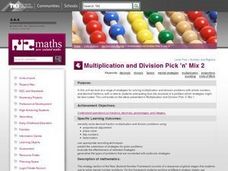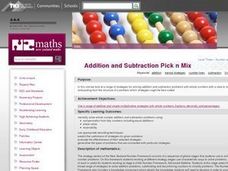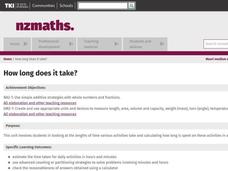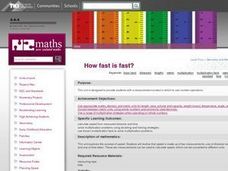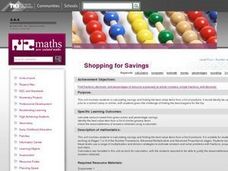Curated OER
Teach Students a Range of Problem-Solving Strategies
Arming students with a multitude of strategies will help them meet their math challenges.
Conneticut Department of Education
Instructional Strategies That Facilitate Learning Across Content Areas
Imagine 28 instructional strategies, appropriate for all subject areas and all grade levels. Directed Reading-Thinking Activities (DRTA), Question-Answer Relationship (QAR) activities, KWL charts, comparison matrixes, classification...
Curated OER
Multiplication and Division Pick 'n' Mix 2
Fifth graders practice a wide range of strategies for solving multiplication and division problems with whole numbers and decimal fractions. They interact with operations on decimals, relevant size and place value of decimals to three...
New Zealand Ministry of Education
Addition and Subtraction Pick n Mix
Teach your class how to mentally solve whole number addition and subtraction problems using compensation from tidy numbers including equal additions. They use appropriate recording techniques and predict the usefulness of strategies for...
Kentucky Department of Education
Multi-Digit Multiplication Strategies
There is more than one way to solve a multiplication problem, and many learners find that the lattice multiplication method can be a helpful one. Fourth graders take an initial formative assessment before working in groups of two or...
Curated OER
Differentiating for High Ability Students
You can challenge high ability students in your classroom with these differentiated lesson plans.
Curated OER
The Part-Adder 2
Third graders use mental-math strategies to solve two-digit plus two-digit addition problems. They observe and discuss online demonstrations, solve word problems as a class, and independently solve problems and describe their solutions...
New York State Education Department
TASC Transition Curriculum: Workshop 2
Flipped classrooms and online tools killed the chalkboard! An awesome, hands-on technology workshop asks teachers across all content areas. to examine model lessons, become familiar with research, and explore tech tools they can...
Curated OER
Addition and Subtraction Pick n Mix 2
Fourth graders practice a wide range of strategies for solving addition and subtraction problems containing decimal fractions. They add and subtract fractions, decimals and integers while generalizing the properties of operations with...
Curated OER
Addition/Subtraction Strategies
Third graders recall all their addition and subtraction facts to 20. They use the relevant number strategy with whole numbers. Students are taught place value in relation to decimals, and identify 'which decimal is larger.' They...
Curated OER
Doing The School Run
Students explore finding the percent of a numbers. They survey their peers to determine modes of transportation used in getting to school. Afterward, students organize information and create graphs and charts. They explore alternative...
Curated OER
Dominoes
Fourth graders solve a dominoes word problem, calculating all the possible outcomes for a sequence of events. They discuss the problem, apply counting strategies, create a tree diagram, and write an explanation of how they solved the...
Curated OER
How Long Does It Take?
Students investigate the lengths of time various activities take and calculate how long is spent on these activities in a week. They complete a worksheet for each activity that is timed, and calculate lengths of time for simulated...
Curated OER
Pythagoras' Theorem
Students are introduced to the Pythagoras' Theorem and its history, proofs and practice in application. Students find perimeters, areas and volume of everyday objects. Students state and explain the theory.
Curated OER
Working Backwards
Sixth graders make up their own math problems. There is only one restriction. That is, the answer has to be the one you are going to give them in a sealed envelope. The problems that they make up can be anything they like. Let Students...
Curated OER
Measuring Beads
Students compare the weight of the students's favorite soft toys directly and then indirectly using beads.
Curated OER
Making Benchmards--Length
Students explore the idea of having Benchmarks to estimate the length of given objects. Students demonstrate acquired knowledge of the basic units of length by making reasonable estimates. Students create a personal benchmark.
Curated OER
The Difference Bar 2
Students use Internet software, The Difference Bar, to work out the difference between two numbers by breaking numbers into parts. Students use mental strategies to work out the difference between any 2 two-digit numbers. Students...
Curated OER
How Fast Is Fast?
Learners make sensible estimates and check the reasonableness of the answers. Students write and solve problems involving decimal multiplication and division. Learners perform calculations with time.
Curated OER
Bill's Number Plates
Students create license plate number combinations using a maximum of six characters, numbers or letters. They discuss personalized license plates, and in small groups create original license plate letter and number combinations to...
Curated OER
Shopping for Savings
Fourth graders calculate savings and identify the best value items from a list of products. They rotate through five studying stations, completing various math activities involving calculators and solving problems related to shopping...
Curated OER
The Difference of Two Squares
Learners practice the use of number properties through exploring the difference of two squares, creating an array model for multiplication, and work with decimal numbers. In groups, students explore patterns in an array and determine...
Curated OER
Pipe Music With Decimals
Students discuss strategies for solving problems with decimals. They find the sum of problems through recognizing place value and by practicing adding numbers both vertically and horizontally. They read and solve real life word...
Curated OER
The Number Partner
First graders study number pairs and identify number pairs that sum to numbers from 10 to 30. They use number pairs to solve addition and subtraction problems. They make sensible estimates and check the reasonableness of answers.


